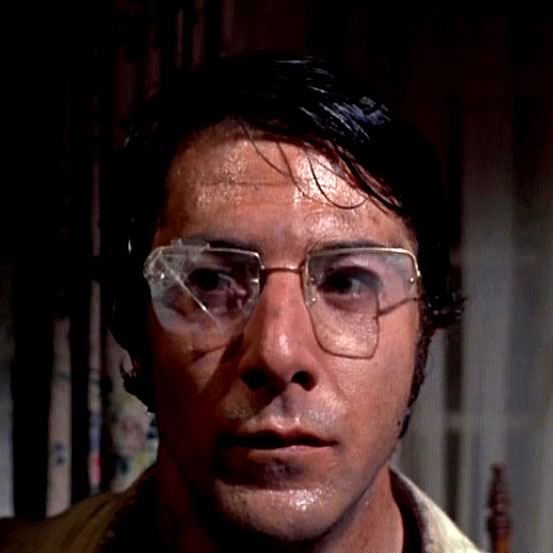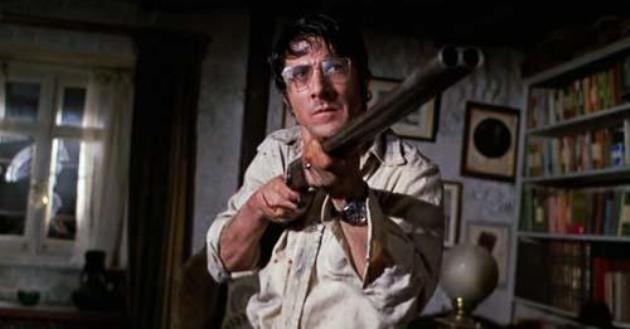 I’m in Manhattan on 9/11 and I’m supposed to be writing about Straw Dogs. And in about three hours I’m going to watch the 49ers opening game against the Seattle Seahawks. Because of all that, I’ve got violence on my mind. There is a world of difference between 49ers linebacker Patrick Willis flattening a Seattle running back and Dustin Hoffman’s fictional David Sumner giving in to a repressed murderous rage. And the gap between those moments of violence and what happened on September 11th begs description. It hadn’t occurred to me until now the oddness of opening the remake of 1971’s Straw Dogs, a movie explicitly about violence, in the week following the 10th anniversary of such a devastating act of violence against the United States. But then again, maybe it makes a certain amount of sense.
I’m in Manhattan on 9/11 and I’m supposed to be writing about Straw Dogs. And in about three hours I’m going to watch the 49ers opening game against the Seattle Seahawks. Because of all that, I’ve got violence on my mind. There is a world of difference between 49ers linebacker Patrick Willis flattening a Seattle running back and Dustin Hoffman’s fictional David Sumner giving in to a repressed murderous rage. And the gap between those moments of violence and what happened on September 11th begs description. It hadn’t occurred to me until now the oddness of opening the remake of 1971’s Straw Dogs, a movie explicitly about violence, in the week following the 10th anniversary of such a devastating act of violence against the United States. But then again, maybe it makes a certain amount of sense.
Nowadays we see graphic violence depicted with numbing regularity in movies, television programs, video games, and commercials. Pretty much everywhere, all the time. But in 1971 when Straw Dogs, Dirty Harry, The French Connection and A Clockwork Orange all came out the cultural critics in America had a to pause for a moment and wonder whether or not it was all just too much.
Unlike the “torture porn” of the Saw franchise and its relatives, that draw on shock as entertaining of titillation, all of those 1971 movies used violence to a specific purporse. Dirty Harry depicted the angry reaction of conservative forces in the wake of the ’60s, The French Connection attempted to show the gritty side of policework in documentary style, and A Clockwork Orange with its “ultraviolence” trapped the audience between raging freedom and destructive conformity. But Sam Peckinpah’s Straw Dogs attempted something on a smaller, human scale.
It’s often missed that the reason David Sumner moves to his wife’s English hometown is to get away from the disruptive college culture he’d been forced to deal with in the United States. David wants to escape even the violence of political demonstrations. It is a rule of emotional physics, not to mention dramatic structure, that whatever we repress only becomes stronger, and David discovers this to his peril. At every turn David tries to repress his violent reactions, his animal nature, and that need to have and protect territory that Peckinpah believes lurks in all our hearts. To Peckinpah, David is the villain of the piece, and all the bad things that happen occur because David’s too much of a repressed intellectual to be a complete human, animal nature and all.
The centerpiece of Straw Dogs is the rape of David’s wife Amy. It’s there for a lot of reasons. It’s there to underscore Peckinpah’s ideas about animals and territory because, yes, Amy is David’s territory. There has been a lot of controversy about the rape sequence in this film because, famously, some critics believe that Peckinpah shows Amy coming to “enjoy” the rape. Part of this comes from the studio recutting the whole rape sequence. The uncut version is much less ambiguous. But what’s important for Peckinpah is, in a way, far more insulting, because the point of the scene is that it is the most intimate and awful “taking” of David’s “property.”
 When David finally unleashes his animal rage, and Amy’s story rounds itself out, we see Peckinpah’s plan reach its terrible end. This is not violence for the sake of violence, this is a movie by a man who has very particular ideas about what violence means for society. What’s disturbing about Straw Dogs isn’t the violence that’s depicted, it’s that the violence depicted doesn’t offer any solutions. The crime of many violent movies isn’t the violence itself, it’s telling stories in which violence offers solutions, closure, or peace. Peckinpah, whatever else his flaws, respects violence far too much to mistake its nature.
When David finally unleashes his animal rage, and Amy’s story rounds itself out, we see Peckinpah’s plan reach its terrible end. This is not violence for the sake of violence, this is a movie by a man who has very particular ideas about what violence means for society. What’s disturbing about Straw Dogs isn’t the violence that’s depicted, it’s that the violence depicted doesn’t offer any solutions. The crime of many violent movies isn’t the violence itself, it’s telling stories in which violence offers solutions, closure, or peace. Peckinpah, whatever else his flaws, respects violence far too much to mistake its nature.
Today in New York, I can’t help thinking about Peckinpah’s message. This is a city full of people who know all too intimately that violence cannot bring healing. Neither can revenge. Real healing requires the courage to feel pain, the courage to grow, and the simple passing of time. I only hope that the remake of Straw Dogs has the moral courage of it’s classic precursor.


